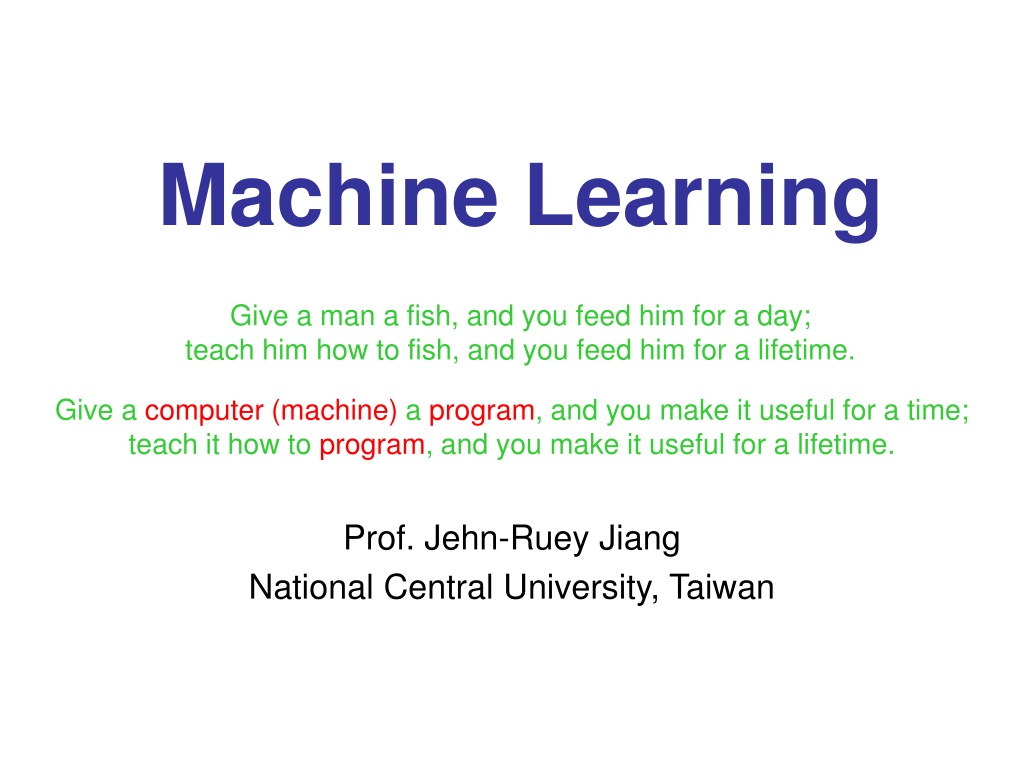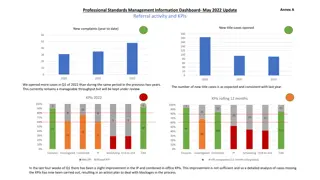
Understanding Machine Learning Paradigms
Machine learning is a field of computer science that empowers computers to learn without explicit programming. Explore the evolution from traditional programming to machine learning paradigms, where data drives problem-solving through models and algorithms.
Uploaded on | 0 Views
Download Presentation

Please find below an Image/Link to download the presentation.
The content on the website is provided AS IS for your information and personal use only. It may not be sold, licensed, or shared on other websites without obtaining consent from the author. If you encounter any issues during the download, it is possible that the publisher has removed the file from their server.
You are allowed to download the files provided on this website for personal or commercial use, subject to the condition that they are used lawfully. All files are the property of their respective owners.
The content on the website is provided AS IS for your information and personal use only. It may not be sold, licensed, or shared on other websites without obtaining consent from the author.
E N D
Presentation Transcript
Machine Learning Give a man a fish, and you feed him for a day; teach him how to fish, and you feed him for a lifetime. Give a computer (machine) a program, and you make it useful for a time; teach it how to program, and you make it useful for a lifetime. Prof. Jehn-Ruey Jiang National Central University, Taiwan
A Few Quotes A breakthrough in machine learning would be worth ten Microsofts (Bill Gates, Chairman, Microsoft) Machine learning is the next Internet (Tony Tether, Director, DARPA) Machine learning is the hot new thing (John Hennessy, President, Stanford) Web rankings today are mostly a matter of machine learning (Prabhakar Raghavan, Dir. Research, Yahoo) Machine learning is going to result in a real revolution (Greg Papadopoulos, CTO, Sun) Source: Slides of Dr. Pedro Domingos
So What Is Machine Learning? Wiki: Machine learning is a field of computer science that gives computers the ability to learn without being explicitly programmed. Arthur Samuel, an American pioneer in the field of computer gaming and artificial intelligence, coined the term "Machine Learning" in 1959 while at IBM. (Arthur Samuel said in 1959: How can computers learn to solve problems without being explicitly programmed? )
So What Is Machine Learning? Pedro Domingos: Getting computers to program themselves Let the data do the work instead! Yi-Fan Chang: A branch of artificial intelligence, concerned with the design and development of algorithms that allow computers to evolve behaviors based on empirical data. As intelligence requires knowledge, it is necessary for the computers to acquire knowledge.
Traditional Programming Data Output Computer Program Machine Learning Data Program Computer Output Source: Slides of Dr. Pedro Domingos
Machine Learning: a new problem-solving paradigm Traditional Programming Paradigm 8 9 Input (Data) Program Machine (Computer) Yes No Output Ex: Problem: check if a given integer n is even. People make the program according to the rule: if n is divisible by 2, then n is even. Machine Learning Paradigm 8, 9, .. Input (Data) 100 Machine (Computer) Model (Program) Yes, No, Output Yes Ex: Same Problem. People give a large number of data and associated outputs, and the machine learns (infers) how to solve the problem by making models (e.g., a deep neural network). 6 Adapted from slides of Dr. Pedro Domingos
Sample ML Applications Go games Pattern (image, voice, etc.) recognition Computational biology Finance E-commerce Space exploration Robotics Information extraction .
Magic? No, more like gardening Seeds = ML Algorithms Nutrients = Data Gardener = You (Trainer) Plants = Programs (Model) Source: Slides of Dr. Pedro Domingos
Types of Machine Learning Supervised (inductive) learning Training data includes desired outputs Unsupervised learning Training data does not include desired outputs Semi-supervised learning Training data includes a few desired outputs Reinforcement learning Rewards from sequence of actions
















